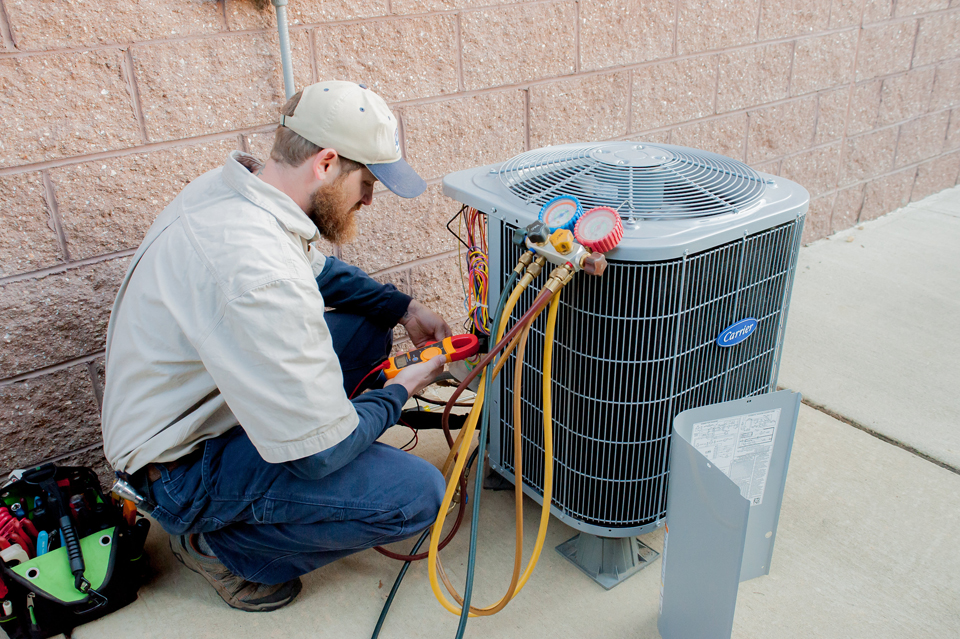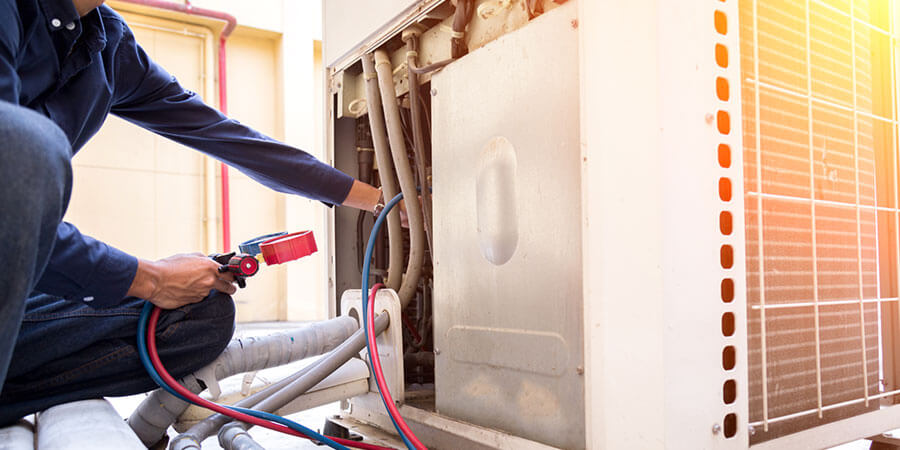Key Factors to Consider Before Your furnace replacement
Key Factors to Consider Before Your furnace replacement
Blog Article
Choosing Between a Warm Pump and Heating System: Trick Factors To Consider for Your A/c Demands
When examining heating alternatives for heating and cooling requires, the decision between a heatpump and a heating system can be complex. Each system uses unique advantages tailored to particular climates and energy effectiveness goals. Recognizing these differences is vital for making an educated selection. Trick variables such as installment expenses and ecological influence additionally make complex the option procedure. Which choice absolutely lines up with one's comfort and sustainability choices? The complying with sections will certainly explore these factors to consider carefully.
Understanding Warm Pumps: Just How They Work and Their Advantages
While lots of house owners think about different home heating choices, understanding how warmth pumps feature and their benefits can greatly influence their decision. Warmth pumps run by transferring warmth as opposed to generating it. In the winter season, they draw out heat from the outside air or ground and move it indoors, while in the summer season, they reverse this procedure, cooling down the home by eliminating warmth outside. This twin functionality makes them functional for year-round environment control.One of the primary advantages of heatpump is their energy effectiveness. They utilize substantially much less electrical power contrasted to typical heating unit, possibly causing reduced utility bills (heat pump replacement ooltewah tn). Additionally, heatpump have a smaller sized carbon impact, making them an eco-friendly choice. They additionally call for much less upkeep than conventional systems, adding to long-term expense financial savings. In general, understanding the technicians and benefits of heatpump can help homeowners make informed decisions regarding their heating and cooling requirements
Checking Out Furnaces: Kinds, Procedure, and Benefits
Heaters can be found in different kinds, consisting of gas, electrical, and oil models, each with distinct operational mechanisms. Understanding these distinctions is necessary, as they affect performance and home heating efficiency. In addition, heaters offer various benefits, such as constant heat outcome and reliability in cooler environments.
Kinds of Furnaces
Heater can differ substantially in layout and operation, with furnaces being a prominent selection among homeowners. There are a number of sorts of heating systems, each making use of different fuel resources and modern technologies. Gas furnaces are usual, leveraging gas to generate heat successfully. Electric furnaces, on the various other hand, utilize electrical resistance to generate heat, usually favored for their simple installment. Oil furnaces, while less usual, work in areas with limited gas access (heat pump service). In addition, condensing heaters take full advantage of energy efficiency by recycling and recording exhaust gases. Each type runs with a system of warm exchangers and ductwork to disperse warm air throughout a home. Recognizing the distinctions between these heating system types is important for informed heating and cooling decisions
Benefits of Heaters
For house owners seeking trusted heat during chilly months, the benefits of heaters are substantial. Furnaces supply regular heating, making sure even temperature levels throughout the home. They are specifically efficient in extreme cool, typically outperforming warmth pumps in icy conditions. Different types, consisting of gas, electrical, and oil furnaces, provide versatility to fulfill diverse needs and preferences.Furnaces also often tend to have reduced first setup expenses compared to heatpump, making them a more obtainable choice for lots of. Their robust design contributes to a much longer life-span, with lots of devices lasting over 15 years with proper maintenance. In addition, modern heating systems are usually equipped with advanced technology for improved effectiveness, which can lead to lowered energy bills. On the whole, heating systems stay a dependable option for efficient home heating.

Energy Effectiveness: Comparing Warmth Pumps and Furnaces
When contrasting power efficiency in between heatpump and heating systems, the Seasonal Power Performance Proportion (SEER) plays a vital role in figuring out performance. In addition, an operational cost evaluation exposes the long-lasting monetary effects of each system. Understanding these elements can guide house owners in making informed decisions concerning their heating services.
Seasonal Energy Performance Ratio
Power efficiency plays a crucial role in the decision-making process in between warm pumps and furnaces, specifically when taking into consideration the Seasonal Energy Performance Ratio (SEER) This metric steps the cooling efficiency of heatpump over a whole cooling period, providing a standard way to evaluate performance. Higher SEER scores indicate better power performance, converting to reduced power consumption and lowered utility bills. In contrast, heaters are commonly assessed using the Yearly Gas Usage Efficiency (AFUE) score, which mirrors heating efficiency. When contrasting these 2 systems, home owners must focus on SEER rankings for warm pumps, as they directly influence general power financial savings and environmental sustainability. A comprehensive understanding of SEER can especially influence the long-lasting fulfillment and cost-effectiveness of the picked HVAC solution.
Functional Cost Analysis
Recognizing the functional costs connected with heatpump and heaters is crucial for homeowners reviewing their alternatives. Heatpump typically provide higher energy effectiveness, converting electric power into heat with marginal waste. This causes lower monthly utility expenses, specifically in moderate environments. On the other hand, standard heaters, specifically gas models, might have lower upfront costs but can incur higher functional costs over time as a result of fuel rates and efficiency ratings.Moreover, heatpump can function as both heating and cooling down systems, possibly lowering the requirement for different heating and cooling systems. While initial investments for warm pumps might be greater, their long-term savings in energy efficiency can make them an extra cost-effective option for many houses. Careful analysis of regional power rates is essential to identify the very best alternative.
Setup Costs: What to Expect for every Furnace
Installation costs for furnace can vary considerably between warm pumps and heating systems, influencing property owners' choices. Warmth pumps typically have greater in advance installment prices, typically ranging from $3,500 to $8,000, depending on the unit size and complexity of installation. This includes the outdoor unit, indoor handling system, and needed ductwork modifications. Alternatively, heating systems tend to have lower initial costs, balancing in between $2,500 and $6,000, which can be appealing for budget-conscious home owners. Nonetheless, setup costs can enhance if comprehensive ductwork is required.Moreover, the choice of fuel kind for heaters-- gas, propane, or electrical-- can likewise impact installment costs. While heatpump offer power effectiveness, their initial investment may hinder some purchasers. Eventually, examining installation prices together with long-term financial savings and efficiency will certainly assist homeowners in making educated choices regarding their furnace.
Environment Factors To Consider: Which System Carries Out Much Better in Your Location
How do environment conditions affect the effectiveness of furnace? The efficiency of heatpump and heating systems can differ significantly depending on the regional environment. In moderate environments, heatpump stand out by effectively moving heat from the outdoors air, making them an energy-saving option. Nonetheless, their efficiency reduces in incredibly cold temperatures, where they might battle to remove adequate warm. On the other hand, heating systems, specifically gas versions, supply regular and trustworthy heat no matter of outside problems, making them more suitable in chillier regions.In locations that experience milder winters, heat pumps can operate effectively year-round, giving both heating and cooling. In contrast, regions with rough winters typically gain from the toughness of heaters. Inevitably, recognizing the regional environment is important when determining between a warm pump and a heater, as it straight impacts their functional performance and general performance.
Upkeep Demands: Long-Term Look After Warmth Pumps vs. Furnaces
While both heatpump and heating systems call for regular upkeep to guarantee peak efficiency, their certain needs YOURURL.com and care routines differ substantially. Furnaces commonly require much less regular focus, with yearly evaluations sufficing to look for gas leakages, tidy filters, and examine general performance. Their easier layout often allows for uncomplicated repairs.In comparison, warm pumps require semiannual upkeep due to their dual function in heating & cooling. This includes cleansing coils, examining cooling agent levels, and guaranteeing that both the exterior and indoor systems operate at their ideal. Furthermore, warm pump maintenance commonly includes more complex elements, making professional maintenance essential.Neglecting upkeep can cause diminished performance Click Here and increased power expenses for both systems. Inevitably, property owners need to consider these long-lasting treatment demands when choosing between a heatpump and a heater, as aggressive maintenance can extend the life expectancy and efficiency of either system significantly.
Ecological Influence: Choosing a Sustainable Heating Choice
The ecological influence of heater is an essential examination for house owners seeking lasting alternatives. Warmth pumps are generally more energy-efficient than conventional heating systems, as they move warmth as opposed to generate it, considerably reducing carbon exhausts. By making use of renewable energy resources, such as geothermal or air-source heat pumps, homeowners can even more minimize their eco-friendly footprint.On the other hand, gas heating systems discharge greenhouse gases and add to air contamination, though they commonly supply higher warmth result. Nonetheless, innovations in modern technology have actually caused the growth of high-efficiency heating systems that reduce emissions.Ultimately, selecting a heating unit includes weighing performance against ecological influence. Property owners are urged to review regional power sources and rewards for renewable systems, ensuring a choice that aligns with both personal convenience and ecological obligation. The choice influences not just immediate convenience however also lasting sustainability and environmental health.
Frequently Asked Concerns
For How Long Do Heat Pumps and Furnaces Typically Last?
The life-span of warm pumps usually ranges from 15 to twenty years, while furnaces can last in between 15 to three decades. Routine upkeep significantly influences their durability and efficiency in giving heating options.
Can I Use a Heatpump in Extremely Cold Climates?
Heatpump can run in very cold climates, however their efficiency diminishes as temperatures decline. In such problems, additional home heating resources might be necessary to preserve comfy indoor temperatures and assure peak efficiency.

What Is the Noise Level of Warm Pumps Versus Furnaces?
The sound levels of warmth pumps and furnaces differ considerably. Usually, warmth pumps operate more silently than standard furnaces, making them more suitable for those conscious appear, while heating systems may produce louder functional sounds during heating cycles.
Are Heat Pumps Suitable for Both Cooling And Heating?
Heatpump are without a doubt appropriate for both heating and air conditioning (heat pump service). They function by transferring warmth, giving efficient temperature control year-round, making them a versatile selection for homeowners looking for an all-in-one cooling and heating service
What Size Heating Unit Do I Need for My Home?
Determining the ideal dimension heating system for a home needs evaluating elements such as square video, insulation quality, regional climate, and the home's format. Consulting a professional can ensure an exact analysis and optimal comfort. Warmth pumps commonly their website provide higher energy performance, transforming electrical power right into warmth with very little waste. In modest climates, warmth pumps excel by effectively transferring warmth from the outdoors air, making them an energy-saving alternative. On the other hand, furnaces, especially gas designs, give reliable and constant heat no matter of outdoor conditions, making them more effective in chillier regions.In areas that experience milder winters months, warmth pumps can run effectively year-round, supplying both heating and cooling. Warm pumps are usually much more energy-efficient than typical heating systems, as they move warmth rather than create it, greatly reducing carbon emissions. By utilizing eco-friendly energy resources, such as air-source or geothermal warmth pumps, property owners can additionally minimize their environmental footprint.On the other hand, natural gas furnaces release greenhouse gases and contribute to air pollution, though they commonly supply higher heat result.
Report this page